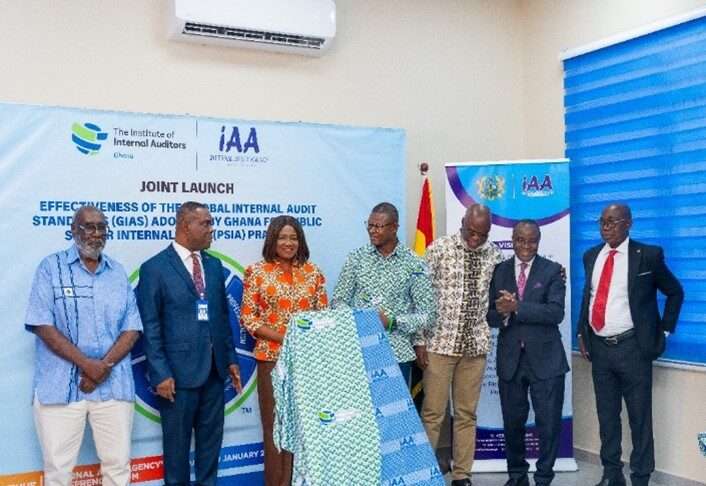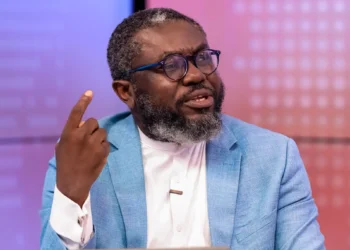Ghana has consistently faced financial irregularities within its public sector, with the Auditor-General’s 2024 report revealing that the nation lost GHS99.57 billion due to various financial infractions.
While the internal audit system is supposed to serve as the first line of defense against such mismanagement, its effectiveness has been questioned due to structural and legal limitations.
The Director of the Internal Audit Agency Dr. Eric Oduro Osae has highlighted the urgent need to amend the Internal Audit Agency Act of 2003 to empower internal auditors and enhance public financial management.
“We have internal auditors across the public sector. And the internal auditors are expected to play a preventive role… to ensure that they advise management of public institutions as far as complying with best financial management practices is concerned.”
Dr. Eric Oduro Osae Director of the Internal Audit Agency
However, he lamented that the law governing internal auditing in Ghana is outdated and has not been revised for the past 22 years.
Dr. Oduro pointed out that internal auditors often lack the power to enforce compliance before the Auditor-General’s external audit takes place.
However, due to their structural placement within public institutions, they are unable to operate effectively.
“Technically, internal audit is expected to prevent some of these irregularities. Before the Auditor-General visits, the internal auditors should have done a review of the system, supported management to prevent some of these irregularities. But the internal auditors are powerless. The law regulating their function is weak. We’ve been talking about this since time immemorial.”
Dr. Eric Oduro Osae Director of the Internal Audit Agency
This compromises their independence and leaves them vulnerable to suppression, intimidation, and administrative victimization.
“Currently, the internal auditors in public institutions report to the same institutions or heads of those institutions whose irregular activity will be prevented by the internal auditor. And we have said that amend the internal audit law and allow the internal auditors to report to a central body so that their professional independence can be guaranteed.”
“At the moment, in the public sector, we have the accountant who reports directly to the Controller. And because of that, they are able to put their foot on the ground. The internal auditors cannot do that. Anytime they try to put their foot on the ground, they are professionally abused or they will be transferred or they will use some administrative means to prevent them from doing their work.”
Dr. Eric Oduro Osae Director of the Internal Audit Agency
Call for a Legislative Amendment

Dr. Oduro noted that previous and current governments have been urged to amend the Internal Audit Act, yet meaningful changes have not been implemented.
“This current government puts an amendment and implementation of the internal audit law in their manifesto. And when we look at page 138, I think paragraph 6, 1, 3, the government said they are going to pass the internal audit law and implement it to improve public financial management and reduce irregularities.”
Dr. Eric Oduro Osae Director of the Internal Audit Agency
Additionally, he indicated that efforts were being made at the executive level to push for the law’s review.
“The Office of the Chief of Staff is in touch with the agency to work with the Ministry of Finance to push the agenda of reviewing the Internal Audit Agency law.”
Dr. Eric Oduro Osae Director of the Internal Audit Agency
A Shift from Reactive to Preventive Auditing
Ghana’s approach to financial mismanagement has largely been reactive rather than proactive. Dr. Oduro Osae criticized this reactive stance.
“Instead of us adopting a preventive approach by strengthening the systems, strengthening internal auditors, we always use a post approach. We allow the horses to bolt out of the stable before we spend money, energy, and resources to recover the money. Some we are not even able to recover.”
Dr. Eric Oduro Osae Director of the Internal Audit Agency
He advocated for improved resourcing and better working conditions for internal auditors, arguing that these professionals play a crucial role in safeguarding public funds.
“As we speak, the conditions of service of internal auditors is one of the worst across the chain. But these are people who are at the forefront of preventing irregularities. If they go hungry, what do you think would happen?”
Dr. Eric Oduro Osae Director of the Internal Audit Agency
Dr. Oduro further revealed that internal auditors often detect financial irregularities long before external auditors do, but their findings are often being ignored.
“This is the same person who is responsible for his promotion. This is the same person who is responsible for increasing his salary. This is the same person who is responsible for approving for him to travel. So how do you expect the internal auditor to be biting? I think we should support professional independence of internal auditors. If not, we’ll continue to see these irregularities recurring year after year.”
Dr. Eric Oduro Osae Director of the Internal Audit Agency
The loss of GHS99.57 billion due to financial irregularities underscores the urgency of reforming Ghana’s internal audit system. Dr. Eric Oduro Osae’s call for legislative amendments, improved conditions of service, and professional independence for internal auditors is critical to preventing further financial losses.
Without these reforms, Ghana risks continuing down the path of weak financial controls and repeated losses to the public purse. Strengthening internal audit mechanisms will be a crucial step toward ensuring accountability and sound financial management in the country.
READ ALSO; Producer Price Inflation Surges to 28.5% in January 2025























